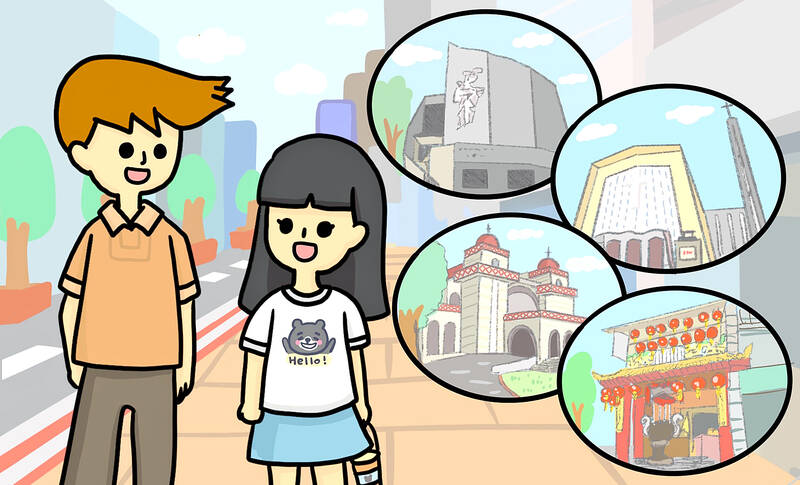對話 Dialogue
馬克:小實,你去過臺北的「天堂路」嗎?
Mǎkè: Xiǎoshí, nǐ qùguò Táiběi de “tiāntáng lù” ma?

小實:「天堂路」在哪裡?臺北有這條路嗎?我沒去過。
Xiǎoshí: “Tiāntáng lù” zài nǎlǐ? Táiběi yǒu zhè tiáo lù ma? Wǒ méi qùguò.
馬克:哈哈,原來你也不知道,它就在大安森林公園旁邊。
Mǎkè: Haha, yuánlái nǐ yě bù zhīdào, tā jiù zài Dà’ān sēnlín gōngyuán pángbiān.
小實:啊!我知道了,你說的是那條路的暱稱。
Xiǎoshí: A! Wǒ zhīdàole, nǐ shuō de shì nà tiáo lù de nìchēng.
馬克:對啊!那條路很特別,有好多天主教和基督教的教堂。
Mǎkè: Duì a! Nà tiáo lù hěn tèbié, yǒu hǎoduō Tiānzhǔjiào hàn Jīdūjiào de jiàotáng.
小實:是啊,那邊不只有教堂,還有回教的清真寺。
Xiǎoshí: Shì a, nàbiān bùzhǐ yǒu jiàotáng, háiyǒu Huíjiào de qīngzhēnsì.
馬克:對!很有趣,走進巷子還有一間比較小的寺廟。
Mǎkè: Duì! Hěn yǒuqù, zǒu jìn xiàngzi háiyǒu yì jiān bǐjiào xiǎo de sìmiào.
小實:哦,那是道教的青龍宮。
Xiǎoshí: O, nà shì Dàojiào de Qīnglónggōng.
馬克:那條路上有好多不同的教堂和寺廟,真的很特別。
Mǎkè: Nà tiáo lù shàng yǒu hǎoduō bùtóng de jiàotáng hàn sìmiào, zhēn de hěn tèbié.
翻譯 Translation
Mark: Xiaoshi, have you ever been to the “Paradise Road” in Taipei?
Xiaoshi: Where is the “Paradise Road”? Is there such a place in Taipei? I’ve never been there.
Mark: Haha, so you don’t know. It’s next to Daan Forest Park.
Xiaoshi: Oh! I see, you are talking about the nickname of that road.
Mark: Yes! That road is quite unusual, there are many catholic and protestant churches.
Xiaoshi: Yes, there are not only Christian churches, but also Muslim mosques over there.
Mark: How interesting! There is also a smaller temple in the alley.
Xiaoshi: Oh, that is the Qinglong Palace of Taoism.
Mark: There are various churches and temples on that road, it’s really special.
單字片語 Vocabulary
1. 天堂 (tiāntáng) Heaven/paradise
2. 暱稱 (nìchēng) nickname
3. 天主教 (tiānzhǔjiào) Catholic
4. 基督教 (jīdūjiào) Christianity (especially protestant in Taiwan)
5. 教堂 (jiàotáng) church
6. 回教 (huíjiào) Islam
7. 清真寺 (qīngzhēnsì) mosque
8. 巷子 (xiàngzi) alley
9. 寺廟 (sìmiào) temple
10. 道教 (dàojiào) Taoism
教材音檔 Audio Files
教材影片 Video Files:
https://www.instagram.com/celc.nou_tw/guide/_/17999106352646292/
實踐大學華語中心提供
By Shih Chien University Chinese Language Center: https://chineseusc.com/

The Dutch introduced the Indian mango (Mangifera indica) to Taiwan in the 17th century. It is a green-skinned mango with thick fibers that get stuck in the teeth, but it boasts a rich aroma and a unique taste. In 1954, Taiwan’s Council of Agriculture introduced several mango cultivars from Florida, USA, including the Irwin, Haden, and Keitt varieties. After seven years of testing and domestication, the Irwin variety was chosen for promotion. Years later, the sample saplings started to bear fruit. These mangoes were large, with thin, vibrant red peels and golden pulp. The Irwin mangoes were mouth-wateringly sweet and

As the priest Antonius Hambroek stood in the dim chamber of Fort Zeelandia, his eldest daughter clung to him, her voice trembling. “Father, don’t go. They’ll kill you, and what will become of Mother and my sisters?” Outside, the sounds of Koxinga’s relentless canon siege boomed through the fortress. The defenders were on the brink of collapse. Starvation gnawed at their resolve, and the air carried the acrid stench of spent gunpowder and rotting flesh. Dutch reinforcements from Batavia had failed to arrive, leaving the garrison isolated and hopeless. Hambroek’s face was calm, though sorrow weighed heavily on his

對話 Dialogue 清清:今天中午我要多吃一點,不然晚上可能會吃不飽。 Qīngqing: Jīntiān zhōngwǔ wǒ yào duō chī yìdiǎn, bùrán wǎnshàng kěnéng huì chībùbǎo. 華華:怎麼了?為什麼會吃不飽? Huáhua: Zěnmele? Wèishénme huì chībùbǎo? 清清:今天大年初七,是「人日節」,傳統上結了婚的女兒要回家給父母送長壽麵,而且最好是素的,我姐姐會回來,只吃素麵,我應該很快就餓了。 Qīngqing: Jīntiān Dànián chūqī, shì “Rénrì jié,” chuántǒng shàng jiéle hūn de nǚ’ér yào huíjiā gěi fùmǔ sòng chángshòumiàn, érqiě zuìhǎo shì sù de, wǒ jiějie huì huílái, zhǐ chī sùmiàn, wǒ yīnggāi hěn kuài jiù èle. 華華:我還是第一次聽說有「人日節」呢!這是怎麼來的啊? Huáhua: Wǒ háishì dì yī cì tīngshuō yǒu “Rénrì jié” ne! Zhè shì zěnme lái de a? 清清:老一輩的人說,女媧是在第七天造出了「人」,所以今天可說是我們每個人的「生日」呢!生日快樂! Qīngqing: Lǎoyíbèi de rén shuō, Nǚwā shì zài dì qī tiān zào chūle “rén,” suǒyǐ jīntiān kěshuōshì wǒmen měi ge rén de “shēngrì” ne! Shēngrì kuàilè! 華華:你也是啊!欸?那前六天女媧都做了什麼呢? Huáhua: Nǐ yěshì a! Éi? Nà

As we bundle up in thick coats to stay warm during the winter, there is a population that has already adapted to extremely low temperatures. These people live in the remote city of Yakutsk, the coldest city on Earth. Yakutsk is situated in the heart of Siberia, which is the capital of the Sakha Republic in Russia. This historic mining city began to flourish in the 19th century following the discovery of gold deposits. Given its construction on permafrost, the average temperature in the city remains below 0°C for over half the year, with winter temperatures dropping to an astonishing -50°C.